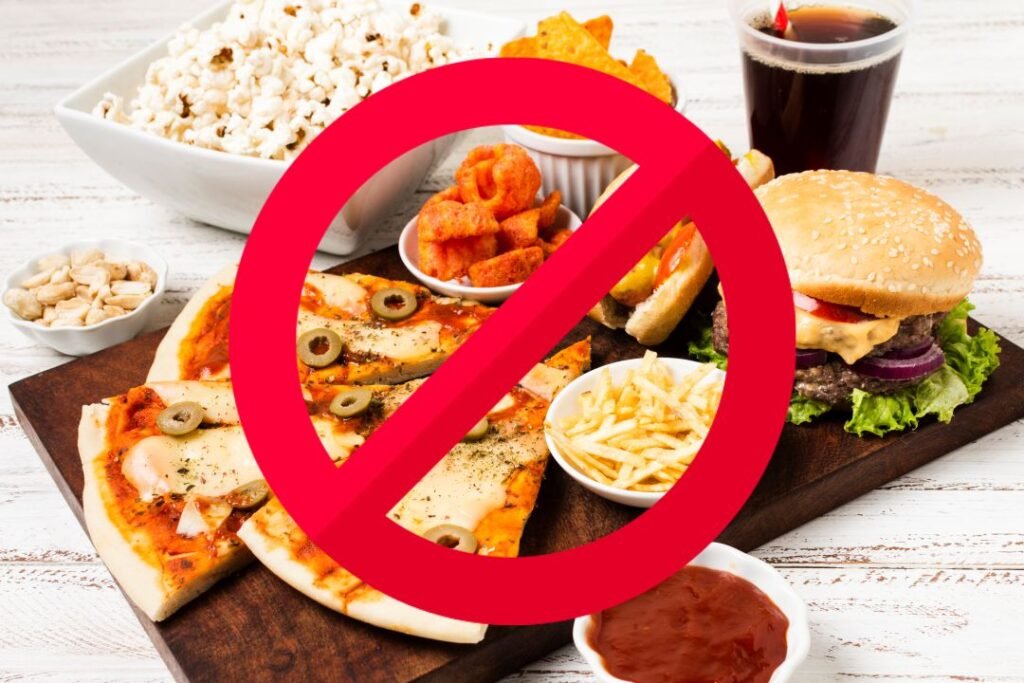| This article is medically reviewed by Dr Harcharanjit Singh Randhawa |
Maintaining a healthy diet is vital for the overall good state of health and vitality. By making small changes to your eating habits, you can significantly improve your health and boost your energy levels.
In this blog post, we will share 15 simple tips to help you make your diet healthier. These tips are easy to implement and can have a positive impact on your overall health.
1. Put fruits and vegetables in half of your plate.

Including more fruits and vegetables in your meals is one of the easiest ways for you to get a better diet. Aim to fill at least half of your plate with a variety of colorful produce. They are packed with essential vitamins, minerals, and fiber, and can help reduce the risk of chronic diseases.
2. Choose Whole Grains over Refined Grains
When selecting grains, opt for whole grains instead of refined grains. Whole grains retain the bran and germ, making them higher in fiber, vitamins, and minerals. Choose whole grain bread, pasta, rice, and cereals to add more nutritional value to your meals.
3. Include Lean Proteins in Your Meals
In order to grow and repair muscle, lean proteins are essential. Incorporate lean sources of protein such as skinless poultry, fish, tofu, beans, and legumes into your meals. These options are lower in saturated fat and can provide the necessary amino acids your body needs.
4. Reduce Added Sugar Intake

Excess added sugar in the diet can contribute to weight gain and various health issues. Decrease your consumption of sugared beverages, processed snacks and desserts. Instead, satisfy your sweet tooth with natural sugars found in fruits or opt for healthier alternatives like stevia or honey.
5. Limit Sodium (Salt) Intake

High intake of sodium may lead to high blood pressure and other health problems. Be mindful of the amount of salt you add to your meals and reduce your intake of processed and packaged foods, which are often high in sodium. Flavor your dishes with herbs, spices, and natural seasonings instead.
6. Drink Plenty of Water

Staying hydrated is crucial for overall health. Make water your go-to beverage and drink plenty throughout the day. Water helps regulate the temperature of your body, facilitates digestion and is beneficial to your skin. To encourage regular hydration, you should carry a reusable water bottle with you.
7. Control Portion Sizes
In order to prevent overeating and promote healthy eating habits, it is important to pay attention to the size of the portions. To help control the size of the portions, use smaller plates, bowls and cups. Pay attention to your body’s hunger and fullness cues to avoid eating more than necessary.
8. Cook Meals at Home
Cooking your own meals at home allows you to control the ingredients and cooking methods used. It allows you to choose healthier options and avoid excessive added sugars, unhealthy fats, and excessive sodium often found in restaurant meals. Experiment with new recipes and make cooking an enjoyable experience.
9. Reduce Processed Food Consumption

High levels of unhealthy fats, added sugars and artificial additives are often found in processed foods. Minimize your intake of processed snacks, frozen meals, and fast food. Opt for whole, unprocessed foods whenever possible to maximize nutritional value.
10. Incorporate Healthy Fats
Not all fats are created equal. You can add healthy fats to your diet such as avocados, nuts, seeds and olive oil. These fats provide essential fatty acids and can contribute to heart health. But, moderation is crucial because fats are high in calories.
11. Plan Your Meals and Snacks
Planning your meals and snacks ahead of time can help you make healthier choices and avoid impulsive food decisions. Set aside some time each week to plan your meals, create a shopping list, and prepare nutritious snacks to have on hand.
12. Eat Mindfully
Paying attention to your meals and enjoying all the bites will help you practice good eating habits. Slow down, chew thoroughly, and listen to your body’s hunger and fullness signals. This approach can help you enjoy your meals more, prevent overeating, and foster a healthier relationship with food.
13. Include Probiotics for Gut Health
Probiotics are beneficial bacteria that support the health of the gut. Include fermented foods like yogurt, kefir, sauerkraut, and kimchi in your diet to introduce probiotics. These foods can improve digestion and boost your immune system.
14. Be Mindful of Liquid Calories
Many beverages, including sodas, juices, and specialty coffees, are high in calories and added sugars. Be mindful of liquid calories and choose healthier options like herbal tea, sparkling water, or homemade fruit-infused water instead.
15. Seek Professional Guidance
If you have specific dietary concerns or goals, consider consulting a registered dietitian or nutritionist. They can provide personalized advice and guidance tailored to your needs, ensuring you make informed choices and optimize your diet for better health.
Conclusion
Improving your diet doesn’t have to be overwhelming. By incorporating these 15 simple tips, you can gradually make your diet healthier and reap the benefits of improved well-being. Remember that small changes can make a big difference over time. Start implementing these tips today and enjoy the journey to a healthier lifestyle.
Why is a Healthy Diet • Nutrition Important ?
The cornerstone of overall well being is a good diet. It plays a vital role in maintaining a healthy weight, reducing the risk of chronic diseases, boosting immunity, improving mental clarity, and enhancing energy levels. By fueling our bodies with the right nutrients, we empower ourselves to live life to the fullest.
The Basics of a Healthy Diet
• Macronutrients : The Building Blocks of Nutrition
The three most important elements of our diet are Macronutrients: carbohydrates, proteins and fats. Each macronutrient serves a specific purpose and should be consumed in appropriate quantities to maintain a balanced diet.
• Carbohydrates : Energizing our Body and Mind
Carbohydrates are our body’s primary source of energy. They can be found in various foods such as grains, fruits, vegetables, and legumes. Opt for complex carbohydrates like whole grains, which provide a steady release of energy and essential fiber for digestive health.
• Proteins : The Body’s Repairing Agents
Proteins are essential for tissue repair, growth, and development. Lean meat, poultry, fish, eggs, dairy products, legumes and nuts are good sources of protein. Incorporate a variety of protein-rich foods into your diet to ensure you receive all the necessary amino acids.
• Fats : The Healthy Source of Energy
Fats are an essential component of a healthy diet, in spite of popular belief. They’re providing energy, supporting cell growth, protecting organs, and helping the body absorb vitamins. Choose healthy fats from sources like avocados, nuts, seeds, and olive oil while limiting saturated and trans fats.
• Micronutrients : The Power of Vitamins and Minerals
It is essential for optimum health to have micronutrients, such as vitamins and minerals. These nutrients play specific roles in bodily functions and should be obtained through a well-rounded diet.
• Vitamins : The Key to Vitality
Vitamins are organic compounds that help with a variety of physiological functions. They are present in fruits, vegetables, whole grains and fortified foods. For example, vitamin C boosts immune function, while vitamin D promotes bone health.
• Minerals : Essential for Body Functions
Minerals are inorganic elements necessary for the proper functioning of our bodies. Calcium supports bone health, iron aids in oxygen transportation, and potassium helps regulate blood pressure. Incorporate mineral-rich foods like leafy greens, dairy products, and lean meats into your diet.
• Hydration : The Elixir of Life
Proper hydration is often overlooked but is vital for maintaining good health. Water makes up a significant portion of our bodies and is essential for digestion, circulation, and temperature regulation. Aim to drink at least eight glasses of water per day and hydrate more during physical activity or in hot weather.
FAQs (Frequently Asked Questions)
Q: What is the ideal daily caloric intake for maintaining a healthy diet ?
Ans : The ideal daily caloric intake varies depending on factors such as age, sex, activity level, and overall health goals. Generally, women need about 1,800-2,400 calories per day, while men require 2,200-3,000 calories. It’s crucial to consult with a healthcare professional or registered dietitian to determine the ideal caloric intake for your specific needs.
Q: Can a healthy diet help prevent chronic diseases ?
Ans : Yes, a healthy diet can significantly reduce the risk of chronic diseases such as obesity, heart disease, diabetes, and certain types of cancer. By consuming nutrient-dense foods, limiting processed foods, and maintaining a balanced diet, you can support your overall health and reduce the risk of developing chronic conditions.
Q: Are there any specific foods that can boost brain health ?
Ans : Absolutely! Several foods are known for their brain-boosting properties. Examples include fatty fish rich in omega-3 fatty acids, blueberries packed with antioxidants, nuts and seeds abundant in vitamins and minerals, and dark chocolate that stimulates blood flow to the brain.
Incorporating these foods into your diet can support cognitive function and mental well-being.
Q: Is it possible to increase my energy levels by eating a healthy diet?
Ans : Yes, a healthy diet plays a significant role in sustaining optimal energy levels. Avoiding sugary foods and opting for complex carbohydrates, lean proteins, and healthy fats provides a steady release of energy throughout the day.
Additionally, staying hydrated and consuming adequate vitamins and minerals contribute to improved energy levels.
Q: Are there any specific diets that promote optimal health?
Ans : While there are various diets claiming to promote optimal health, the best approach is to adopt a balanced and sustainable eating plan.
The Mediterranean diet, for example, emphasizes whole foods, lean proteins, healthy fats, and an abundance of fruits and vegetables. It has been associated with numerous health benefits, including reduced risk of heart disease and improved longevity.
Q: How can I make healthy eating a lifelong habit?
Ans : Making healthy eating a lifelong habit requires small, gradual changes that become sustainable over time. Start by setting realistic goals, such as incorporating more fruits and vegetables into your meals or reducing processed food consumption. Find healthy recipes you enjoy and experiment with new flavors. Remember that consistency is key, and it’s okay to indulge in moderation.
Conclusion
A Healthy Diet and proper nutrition are fundamental to achieving and maintaining optimal health. By prioritizing nutrient-dense foods, staying hydrated, and making informed choices, you can unlock the full potential of your body and mind.
Start your journey towards a vibrant and fulfilling life today by embracing the power of a healthy diet.

